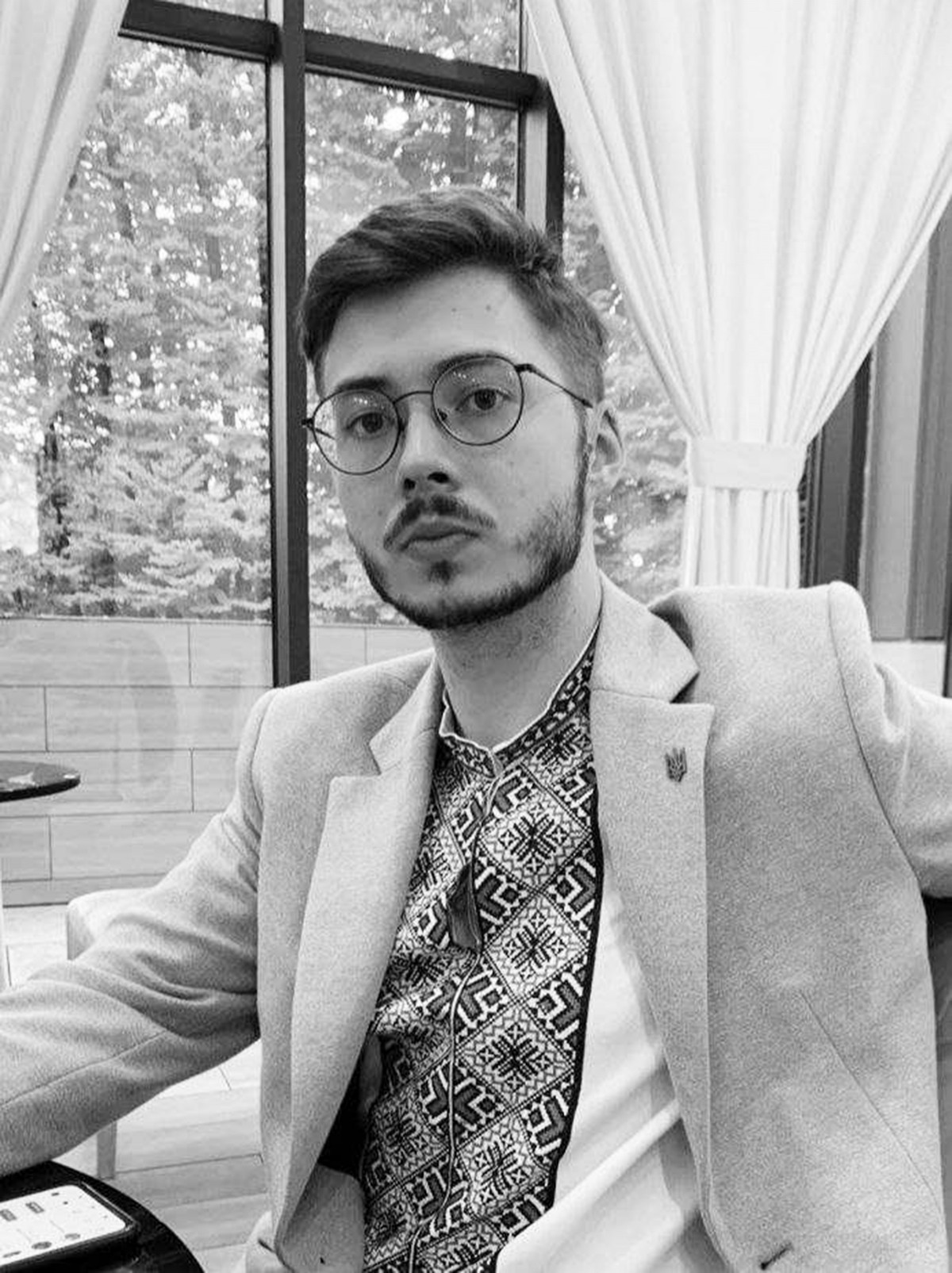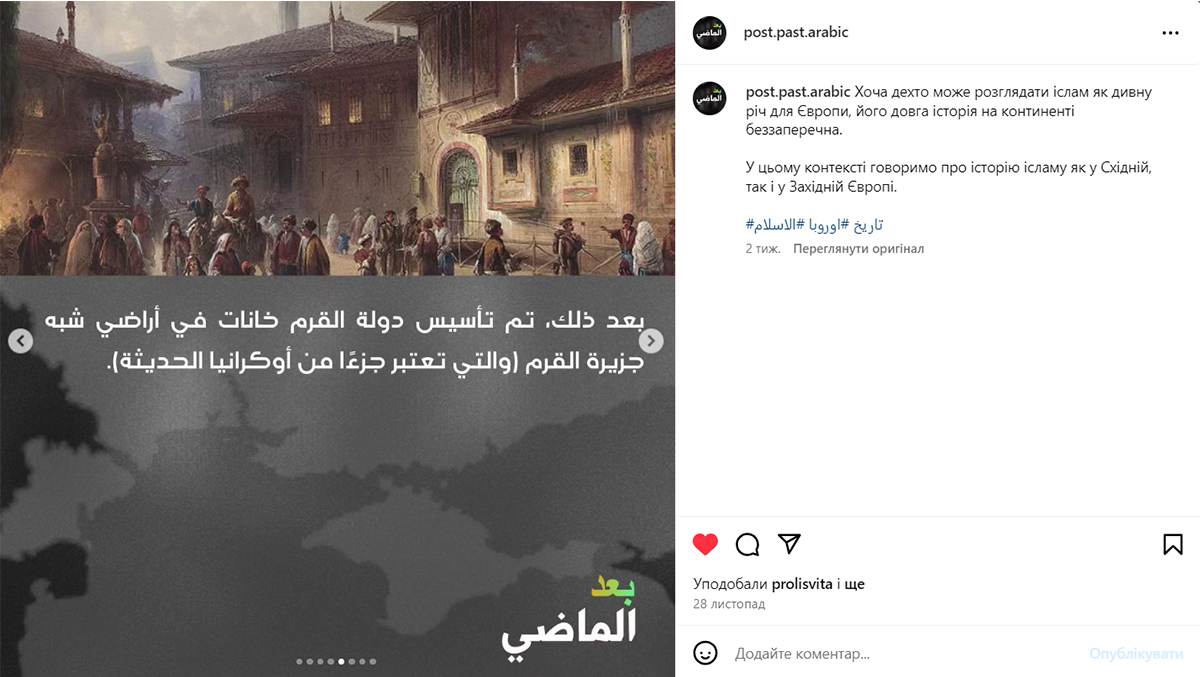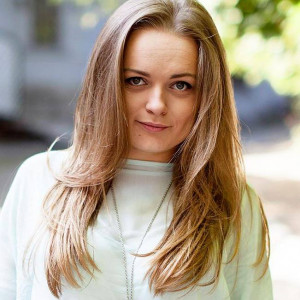Українською читайте тут.
Ukrainian media write relatively little about Arab countries, even more so for this region’s audience. Journalist and media analyst Oleksiy Pryimak decided to fill this niche. He created the Post-Past media project and is trying to develop it independently. Detector Media spoke with Oleksiy about the need to work with an Arab audience and non-engaged historians, whether one person can create media, and how much money one needs to conduct this project.
Launching the website
Oleksiy Pryimak studied media analytics at Taras Shevchenko Kyiv National University. Then he wrote articles about propaganda, disinformation, and conspiracy thinking for British publications such as Byline Times and The Spectator, and Ukrainian ones such as Suspilne, The Ukrainians (their NZL project, "News of a healthy person"), "Svidomi", and research project Fixers&Stringers. For the National Security and Defense Council’s Center for Countering Disinformation, he conducted research pieces on the media space of North African countries: Morocco, Egypt, Algeria, Libya, and Tunisia. While analyzing the media, he became interested in historical fakes and started a project to combat them.

Oleksiy Priymak
"At one time, I had the misfortune of conducting a weekly content analysis of the RIA Novosti Telegram channel. In the seven days before "Victory Day", Russians published 123 messages on historical topics. This is called news in Russia. Because of this apparent fixation on the past, this issue was interesting and lacking for me, and the politicization of history is a prevalent issue. For example, I faced aggression towards me because some of our refutations did not fall under any political ideas of the linear history."
He created the Post-Past project, launching the site in May 2023. "Post-Past project’s philosophy revolves around the idea of time. Why the post-past? Because it's about overcoming the past. We are trying to do everything so that the past remains in the past and does not replace our present," explains Oleksiy.
He began to invite historians to the project, ones he considers professional and nonpartisan and who, in his opinion, can separate political views from scientific research. Among them was Yevhen Sinytsia, the chairman of the board of the public organization "Union of Archaeologists of Ukraine", specializing in fakes about the Middle Ages, which Russian propaganda often mentioned during the project's launch. Serhiy Hromenko, the author of the books "250 Years of Lies: Russian Myths of the History of Crimea" and "Skoropadskyi and Crimea: From Opposition to Accession", writes about Crimea and the Crimean Tatars for the Post-Past project. Viktor Horobets, Andriy Rukkas, Mykhailo Yakubovych (author of the first complete translation of the Koran into Ukrainian), Alina Ponypalyak (author of the book "The Last Commander of the UPA. The Life and Struggle of Vasyl Kuk"), and many others also periodically write for Post-Past project as well.
The website also has a sub-project — "Qirim in time". It attempts to present the history of Crimean Tatars in Ukraine and the real history of Crimea in a way that resists the spread of misinformation in Ukrainian society. The Post-Past project generally publishes both refutations of historical myths and authored columns about history.
The idea of promoting Ukrainian narratives in Arab countries
At the same time, at the beginning of the full-scale war, Oleksiy Pryimak became interested in Arab countries. He was fascinated so much that he started learning Arabic.
"A full-scale invasion led me to the Arabic language; I started learning it since then. At first, I did it myself through various applications, and later, I hired a teacher and continue to learn with him to this day. I don't remember what prompted me; I just wanted it. At first, my interest in Arabic started not with romantic notions but with negative associations, such as terrorism and extremist movements, but over time, this has changed a lot. I feel a lot of love for the culture, language, and people there, and I'm immersed in it with my head. I have learned many different languages, and it is easier for me to start a new one now. I just understand how to approach it. That's why I can read and write in Arabic now and understand it well," says Oleksiy Pryimak.
Communicating with the residents of these countries, he realized that Ukraine lacks resources that could tell Arabic-speaking people about what is happening. He believes that for 30 years, almost nothing has been done in this direction. He mentions the أوكرانيا بالعربية (Ukrania bil-Arabia, or "Ukraine in Arabic"), created by Palestinian journalist Mohammad Farajallah. This media writes about Ukraine for Arab audiences, as well as about the Middle East for Ukrainians. According to Oleksiy Pryimak, Mohammad Farajallah is a very professional journalist, and a large part of Ukraine's public diplomacy in the Middle East is owed to him. However, Pryimak says, after the Hamas attack on Israel and Ukraine's clearly stated pro-Israeli position, he can hardly be objective. According to Oleksiy, no one can tell the Arab audience about Ukraine and our war in an uncomplicated way.
"We have several prejudiced state projects that have the word "Ukraine" in the title, but it is more effective to approach the Arab audience in disguise. Perhaps it is a slight manipulation, but we are now in such a situation that there is no other way. I wanted to offer something uniquely ours, on the one hand, a resource that would not clearly be Ukrainian, but on the other hand, it would be created by Ukrainians. — I analyzed Ukrainian Arabic-speaking embassies on Twitter (X). To understand the content level, I will share these facts. For some time, our embassy in Lebanon simply translated into Arabic the daily summaries of the Russians killed at the front. I do not understand what Saudi or Lebanese person would be interested in this. In addition, it can look suspiciously aggressive to them. Now the work has improved, but the circumstances have worsened significantly," — says Pryimak."
In 2022, Arab News conducted a survey among residents of Arab countries about their attitude to the war in Ukraine. 16% of respondents supported Russia, 18% supported Ukraine, and 66% were undecided. Now, Oleksiy believes, support for Ukraine has already wavered, and the Arab audience has become much more prejudiced, both because of the Russian propaganda that operates in the countries, because of Ukraine's position in the Palestine-Israeli conflict, and because few people talk to this audience about Ukraine.
"Yet, the Arab world is important, at least because these are rich countries. There were cases when, for example, people from Kuwait transferred money to the Armed Forces [of Ukraine], and we are talking about tens of dollars, which for them is just a penny, but for us, it is important money. They did it simply because they saw information about what Russia was doing. But more often Arabs, trying to find some information about Ukraine, come across Russian resources," he says.
That is why Oleksiy launched the Post-Past project in Arabic on social networks. He wants to make short publications in Arabic, for example, on the topic of Islam in Europe, weaving in pro-Ukrainian narratives, in particular, about the fact that Russia carried out the genocide of the Crimean Tatars in the past and continues repression against them to this day.
The first such post on Instagram is a photo and a short text in Arabic: “While some may view Islam as an odd aspect for Europe, its long history on the continent is undeniable. In this context, we discuss the history of Islam both in Eastern and Western Europe." The text on the picture states that there were Muslim states in Eastern Europe, for example, the Crimean Khanate, which Russia destroyed.

The post tells the Arabs about Islam in Europe and, at the same time, about the Crimean Khanate destroyed by Russia
For two dollars, he promoted the post to the desired countries, and the Arab audience responded well to it: immediately, the reach was more than 3,000 users, and more than 40 of them subscribed, although the page had 0 followers before that.
"This is very encouraging. Therefore, I will try to continue in the same spirit and attract organic traffic through videos on YouTube, TikTok, and Instagram — video formats work well today. I will try to engage the users with interesting subjects as well. My friends from Egypt, Iraq, and Palestinians helped me find topics. I believe that by reading this post, a person receives information not available in the Arab media and will not reach him in any way. This information could be useful for overcoming prejudices. Yet, only Ukrainians can tell it. None of the people who read the post reacted aggressively to it, meaning it was interpreted as an organically woven piece of information. In the future, I plan to dilute Islam and other topics potentially interesting to Arabs with the Ukrainian context and try to integrate it as unobtrusively as possible," explains Oleksiy Pryimak.
Project development
Oleksiy does everything on his own — from the idea to maintaining the site and paying the fees for the texts from his own funds or partially from those he has already won at competitions. The project has existed for a little more than half a year. During this time, it received a one-time scholarship of UAH 18,000 from the Udonation fund, EUR 3,500 under the Mediengeist 2.0 program: EUR 1,000 — as a finalist along with nine other projects on countering disinformation, and EUR 2,500— as a prize for audience sympathy.
The Post-Past project received the prize of audience sympathy and a certificate for EUR 2,500
He spent the already-received money on strengthening and stabilizing the site, purchasing the equipment for launching podcasts in the future, and on royalties and advertising on social networks. In the future, he also plans to pay royalties to Arabic-speaking speakers, i.e., those for whom Arabic is their native language, by involving them in videos on TikTok, YouTube, and Instagram.
"In the future, if there is an opportunity to pour more money into the Ukrainian Post-Past project, we will expand the number and styles of formats and depart from solely texts," says Oleksiy.
He also wants to organize a lecture at one of the Middle Eastern universities on the topic of the Crimean Tatar state, and he has already thought about whom he will propose to conduct it — the historian Mykhailo Yakubovich, who has repeatedly written for the Post-Past project. Yet, this requires additional funding.
Therefore, in the near future, he intends to apply for a grant from the Ukrainian Institute. He is currently looking for projects aimed at foreign audiences, especially those with whom the Ukrainian media or the state works little. In such a case, the dream prize can amount to EUR 10,000. But for now, everything depends only on Oleksiy's enthusiasm. He jokes that it is possible to create media on your own — or at least the one that would look like media. The most important thing is to believe in your idea and the need for such a product.


